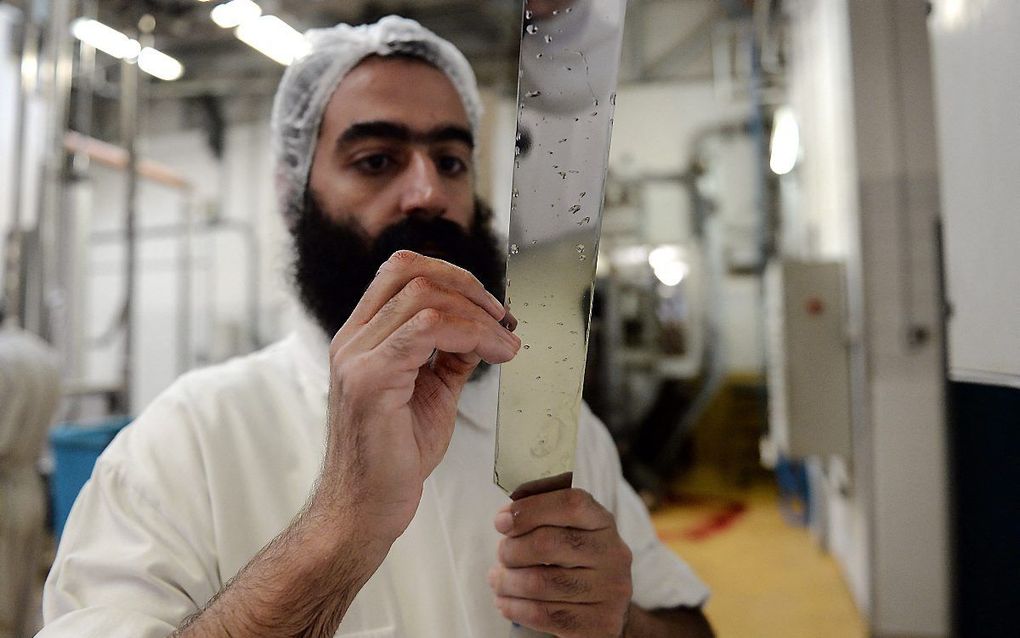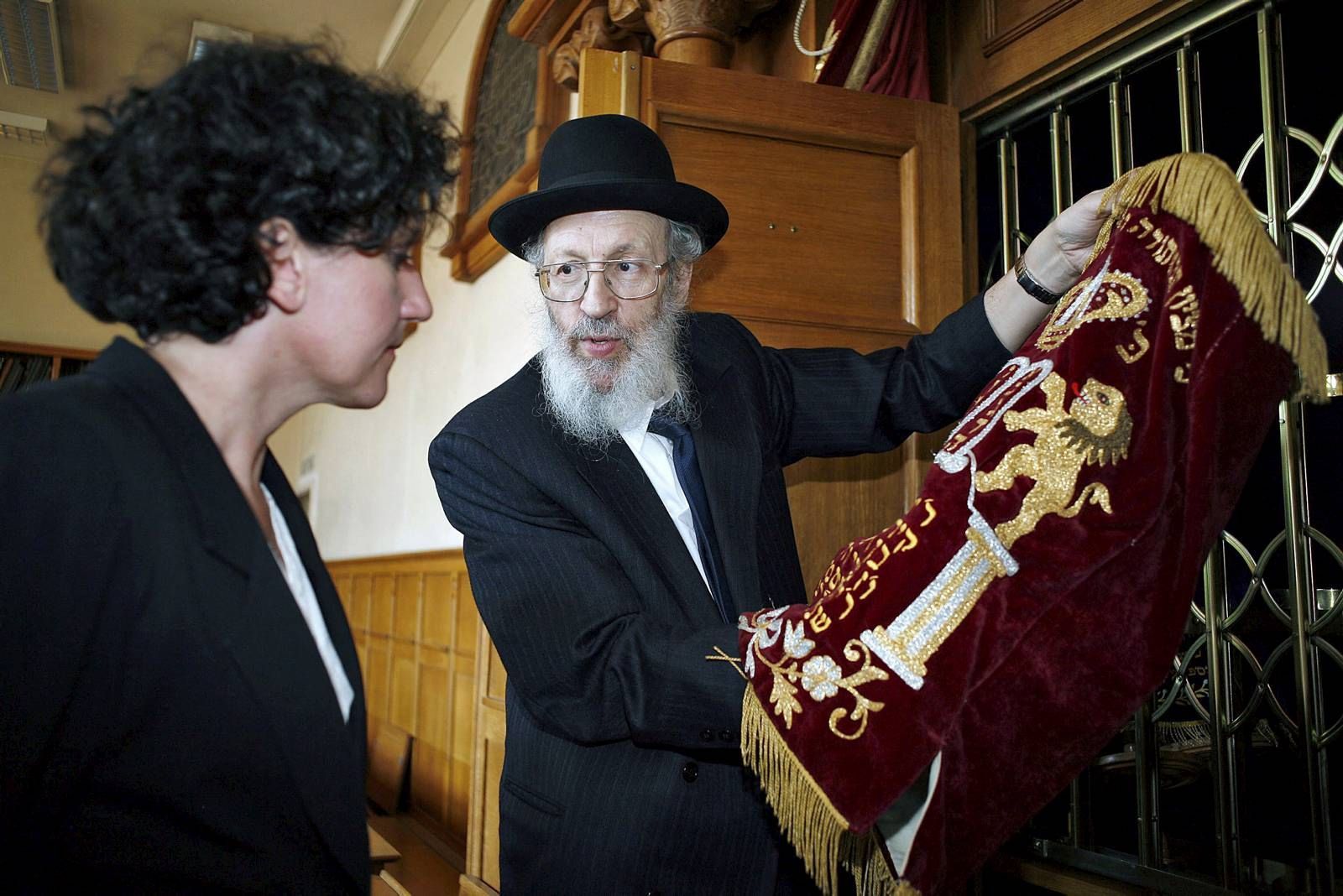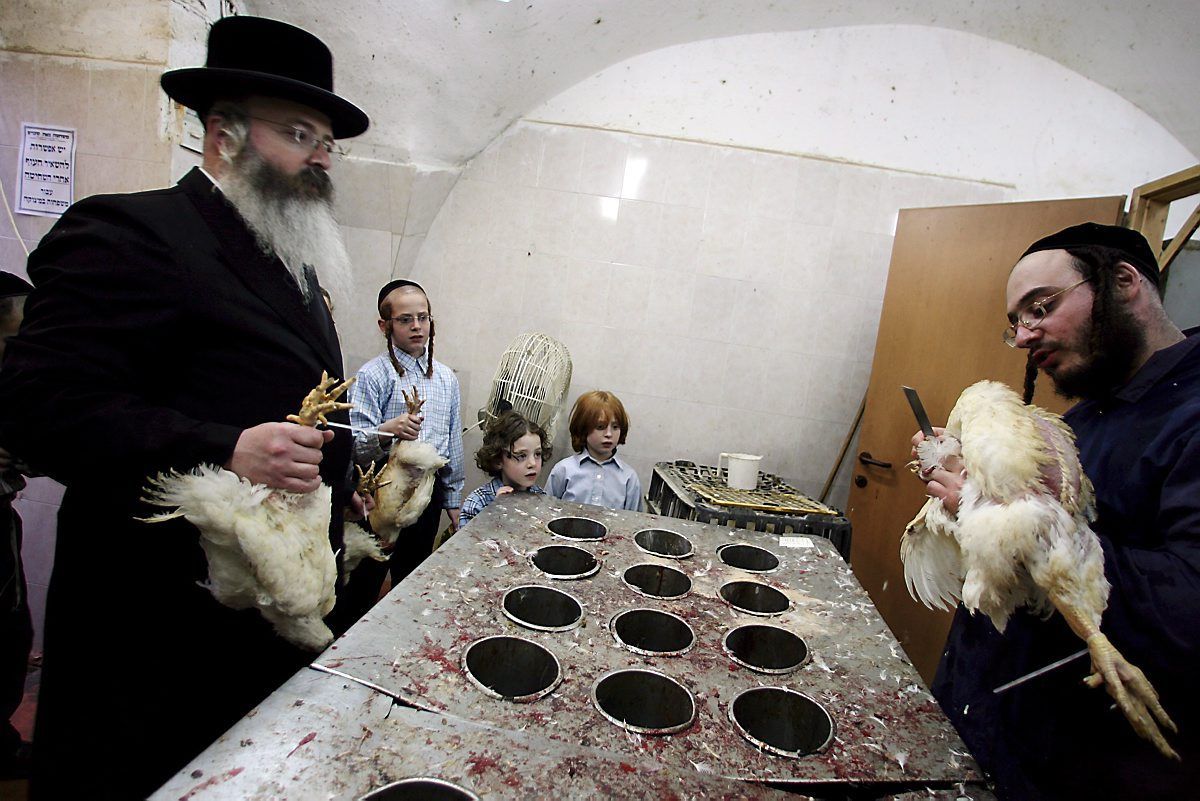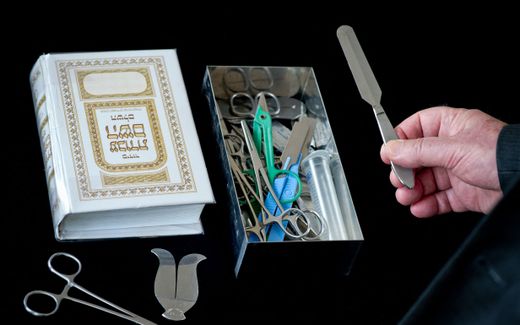Religious slaughter in Europe is getting more difficult
22-10-2021
Western Europe
Evert van Vlastuin, RD

Sharp enough? For shechita, the blade must be without any burrs. Despite of that, kosher slaughter is getting more and more controversial. Photo AFP, Frederick Florin
Western Europe
Being kind to minorities is a virtue in Europe. But being good to animals is growing in prestige. If Jews want to eat meat that has not been slaughtered properly, it will be difficult to attain it. Who will win: the minority or the animal? "As long as the newspapers write that an animal suffers because of our slaughter, politicians will follow that narrative."
Just a little longer, and then the Flemish Jews will know where they stand. Only one more court has to rule on the ban on kosher slaughter in the region. And then it will be definitively clear where the estimated 40,000 Jews in Belgium must get their meat from; their own country or the rest of Europe.
Forbidden in Flanders and Wallonia
In Belgium, the Constitutional Court affirmed the banning of religious slaughter (without pre-stunning) in the regions Flanders and Wallonia. According to their decision in early October, the judges were convinced that a ban would promote animal welfare.
The ban has especially consequences for Belgian Jews.
At this moment, religious slaughter is only possible in the central Brussels region.
In April, the Reformatorisch Dagblad wrote a background article about the difficulties of religious slaughter in wider Europe. That's this article here.
In Belgium, religious slaughter is only allowed in the Brussels region, where Islamic halal slaughter continues. Jews currently get their meat from abroad. "For slaughterhouses in Brussels, we bring no revenue. Therefore, we import from England, Poland and Israel", says Philippe Pollak, director of the Jewish community Shomre Hadas in Antwerp. He would love to import kosher meat from the Netherlands. But since 2018, the Dutch are only allowed to produce kosher meat for domestic consumption. In Germany, there has been an export ban since 2002.
Complaint
Since December 2020, the Constitutional Court of Belgium has been considering a complaint from the Central Israelite Consistory and Muslim organisations. These organisations argue that the 2017 ban on religious slaughter is a restriction on religious freedom.
The Belgian court thus faces a dilemma. On the one hand, Jews have the right to religious freedom. On the other hand, the growing appreciation of animal welfare creates a new "normative context", according to the European Court of Justice in December.
The Belgian court has sought the advice of the EU court. It concluded that the government is allowed to impose requirements for slaughter from the perspective of animal welfare. Because believers can always import meat, their way of life will not be threatened, the judges in Luxembourg said.
In other European countries, judges and legislators have already said that Jews can import meat from abroad. Thus, religious slaughter was banned in several countries after the year 2000.

In 2014, the Danish government understood that import is not always possible, for example, if all countries have banned kosher slaughter. Therefore, Copenhagen made a slight exception to the ban on religious slaughter. "If it should suddenly prove impossible to import meat, we are still allowed to slaughter ourselves," said Susanne Hansen, spokeswoman for the Jewish community in Copenhagen. "In this way, Denmark guarantees the right to the Jewish way of life."
In Sweden, Mrs Ute Steyer, the Chief Rabbi, is not used to anything other than imported meat. However, this creates a practical dilemma. "Imported meat is three or four times more expensive. All that transport also leads to CO2 emissions, of course. So let us see meat more as a treat than as fast food."
Sweden has had a ban on slaughter without stunning since 1937. The kosher meat for the Jewish community is brought in from abroad or bought online in webshops like kosher4u.eu. "There are a few kosher shops. Jews who live far away from them choose to eat differently. Of the approximately 20,000 Jews, only a minority live kosher. Or they do it only on Sabbath."
Anti-Semitism
Jewish meat traders see their business thriving, says Yehuda Giavarini. His company Gustofino Food in Parma, Italy, offers kosher meat products. "Our animals come from all over Europe. And our products also go to all of Europe. Especially to France; with half a million Jews, that is our biggest market."
Paying more attention to animal welfare is not anti-Semitism, Jews across Europe emphasise. "People think that it is nicer for an animal not to undergo a shechita (slaughter without pre-stunning, EvV)," says Polish Chief Rabbi Michael Shudrich. "That is, of course, not anti-Semitism."
In Flanders and Wallonia, the main issue was to curtail the freedoms of Muslims, Philippe Pollak believes. "One might have wanted to give us space, but that was not possible. So, we were collateral damage."
How does kosher slaughter work?
First the stun, then the knife. That is the rule in the European slaughter directive of 2009. No animal may be slaughtered while being conscious. Stunning is usually a blow from a hammer pistol to the skull, causing the animal to lose consciousness. EU member states are allowed to make an exception for slaughter without stunning for religious reasons.
In the United States, it is different. There, the law also recognises un-stunned religious slaughter as a humane procedure.
The Jewish kosher slaughter (shehitah) always involves several people, usually three. First of all, the slaughterer himself (shochet, trained as a rabbi), another rabbi who checks whether the rules are followed, and a third person. At the start, the rabbi goes over the knife's sharpness with his nail to check that there is no burr on it. The animal must not feel the cut.
The animal must be immobilised while being cut. The slaughterhouse has a special cage for this purpose.
According to the regulations, killing life is a religious act that must be performed with reverence. Out of respect for the animal, the slaughter should cut both arteries and the windpipe in one movement. As soon as the blood flows out, the animal loses consciousness almost immediately.
Once the animal is dead, it is examined whether all its organs are intact. If not, the meat cannot be considered kosher. The fattier parts of a cow are not kosher anyway; these are usually sold as halal meat.
A stunned animal cannot walk the required four steps and is therefore not suitable for kosher slaughter. According to Jewish regulations, only healthy animals may be slaughtered.
According to the covenant for ritual slaughter in the Netherlands, each animal is checked to see if it loses consciousness within 40 seconds. If not, the animal is stunned.
For kosher slaughter, supervision and certificates are required. These are provided in exchange for payment by a Jewish community. This financial element ensures that a ban on religious slaughter also has economic consequences for a Jewish congregation.
Jews feel misunderstood. After all, no one favours animal welfare more than a religious Jew, claims Pinchas Kornfeld, chairman of the European Board of Shechita and director of the Machsike Hadas congregation in Antwerp. "For us, it is precisely about animals, not suffering. But as long as newspapers write that an animal suffers at our slaughter, politicians will follow suit."

The Italian meat producer, Yehuda Giavarini, endorses that statement. "The animal must be slaughtered as painlessly as possible. That is why the shochet (kosher slaughterer, EvV) must never be a sadist. He may not enjoy killing an animal; it is a religious act. The animal must be unconscious in one go. I don't know of any method of slaughter for which the requirements are so strict, not even Halal."
Jews from many countries dispute that slaughter without stunning is less pleasant for the animal. They refer to studies that show that stunning does not always work. Kornfeld: "The failure rate for cattle and sheep is between 6 and 16 per cent. These animals suffer a lot of pain and are sometimes slaughtered without stunning."
Different percentages are circulating about the failures. But even with the lowest estimates, many animals are involved. According to Dutch statistics, in 2020, 617 million land animals were slaughtered in the country; 578 million (over 93 per cent) of which were chickens. The total number of animals slaughtered according to religious rules is 30,000, of which less than 5,000 are killed according to the kosher method. Even if stunning would fail in only 1 per cent, those 6.17 million animals would still far exceed the 30,000 ritually slaughtered.
Sleep
Ute Steyer, the Swedish rabbi, feels that the public is being deliberately misled regarding animal welfare. "The story that the poor animal is put to sleep before it is killed is a fairy tale. In reality, the animals are only stunned because they are calmer, and the slaughterer can work faster. Industrial slaughter is about numbers, not welfare. If you care about animals, become a vegetarian; that is an ethical choice."
Steyer points to the opinion of the Advocate General of the European Court of Justice in September 2020. "He stated that Flanders must allow religious slaughter because of religious freedom. The Swedish government then started lobbying the judges hard to influence the conclusion. It was, of course, feared that they would jeopardise the Swedish ban." Indeed, the European court's ruling refers to the input of Sweden, Denmark and Finland.

Steyer finds it suspicious that the European court ruling explicitly excludes hunting from EU animal welfare requirements. "Hunting is not subject to European stun requirements because it is a cultural tradition. But if hunting is allowed and a religious tradition is hindered, you must forgive me for seeing that as anti-Islamic and anti-Semitic. By banning recreational hunting, you can achieve much more for animal welfare than by banning religious slaughter."
Until 2017, Shechita was only banned in countries where this slaughter was not occurring. In 2012, for example, Slovenia banned Jewish slaughter. "The few hundred Jews who live here get their meat from Italy," says Chief Rabbi Ariel Haddad. "The market works, and we get our meat."
In 2014, Denmark also made slaughter without pre-stunning impossible. "But here, there was no slaughter at all," says Susanne Hansen, spokeswoman for the Jewish community in Copenhagen. "Therefore, nothing has changed."
The situation is different with the 2017 ban in Flanders and Wallonia. Those were the first areas to end an existing practice. Except in the occupation years 1940-45, the slaughter was practised there for hundreds of years. As in many other countries, banning slaughter without stunning was one of the first measures imposed by the Nazis in 1940.
Vodka
The most prominent exporter of kosher meat in Europe at the moment is Poland. Kosher and halal meats have an export value of EUR 1.5 billion (5 per cent of all agricultural exports). Arab countries and Israel are also among the countries where the goods are going. In Israel, even kosher vodka from Poland can be found on the shelves.
In 2013, Poland briefly banned religious slaughter until the constitutional court declared that ban invalid in 2014. However, the ruling PiS party is again considering banning slaughter without stunning. Minister Grzegorz Puda (Agriculture) proposed in mid-2020 to reinstate the stunning requirement in full, despite its economic importance. Shortly afterwards, he withdrew the proposal but announced that he would return to it. The Ministry of Agriculture says that there are no plans to do so "at present". Both the Israeli Embassy and the Jewish Community say there is "no current danger". "If that proposal comes up again, we will again make ourselves heard loud and clear," says Rabbi Michael Schudrich.

There are no guarantees, assures Schudrich. "But do you have a guarantee that you will still be alive in an hour? We'll wait and see", he says resignedly.
Jews in other countries react similarly. The Dutch covenant on religious slaughter is pretty harsh, says Ruben Vis, general secretary of the Netherlands Israelite denomination (NIK). "But Jewish religious life is always a challenge."
More critical to Vis is that Jews can feel at home in a country. "Research shows that the freedom for kosher slaughter affects the feeling of safety. Can you be who you want to be with your identity?"
Swedish Rabbi Steyer links the slaughter to the freedom for circumcision. "In countries where the shechita is discussed, often the brit milah (circumcision, EvV) comes up for discussion as well. In my opinion, none of this is harmless. If you forbid circumcision, you make Jewish life itself completely impossible."
Countries where un-stunned slaughter is forbidden
Flanders in Belgium, from 2017
Wallonia in Belgium, from 2017
Denmark, from 2014
Iceland, from 2013
Slovenia, from 2012
Liechtenstein, from 2010
Sweden, from 1937
Finland, from 1934
Norway, from 1929
Switzerland, from 1893
This article was published previously by the Dutch Reformatorisch Dagblad on April 19th, 2021.



